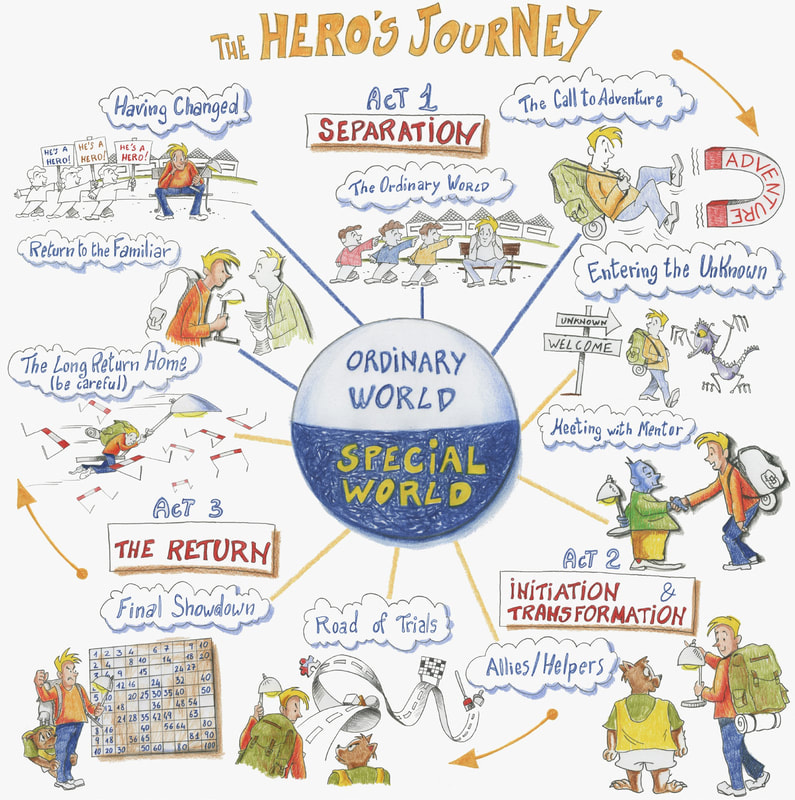Austin Scholar #141: Childhood as a hero’s journey
& how the Hero’s Journey transformed the way I look at the world
Hey, y'all!
This week from Austin Scholar...
Austin’s Anecdote: How the Hero’s Journey transformed the way I look at the world
Childhood as a hero’s journey (& tricking your kid into becoming a problem-solver)
Scholar’s Sources: What I’ve been thinking about…
I cried last week for the first time since the quarter started. As incredible as it is to be a student at Stanford, it’s still really, really hard. Overwhelm, duck syndrome (looking fine on the surface while really you’re struggling underwater), missing family and friends, being in a new place, classes, constant midterms, hate comments on my newsletter…it all catches up with you at some point.
In my newsletters, I feel like I try to always put up an “I have everything managed” front, but I’m learning firsthand that everyone will have their ups and downs – life does not run smoothly. And the cool thing about that situation – instead of wallowing, I went to dinner with my friends and watched an episode of a trashy reality TV show. And after? Instead of still being overwhelmed, I felt proud of how I helped myself.
(Heads up: the third source for Scholar’s Sources this week is my favorite thing I’ve read in a while – it will tell you the secret to raising exceptional kids.)
Austin’s Anecdote: How the Hero’s Journey transformed the way I look at the world
The Hero’s Journey has been a part of my education since the moment I left traditional school.
Back when Alpha was held in our principal’s house, he put a poster outlining the Hero’s Journey on the wall of my favorite room (there was no furniture so my friends and I did cartwheels and handstands during breaks):
Every book report required that I wrote how that story connected to the Hero’s Journey and the speeches I gave for the afternoon workshops all followed the same format.
It soon trickled into other parts of my life – I would watch movies and TV shows and start to notice the Road of Trials and Return to the Familiar and Having Changed. Even if it didn’t initially seem like it, every good story followed this path. When my dad told stories about the exploits he got up to when he was younger, he – perhaps unknowingly – told them as a Hero’s Journey. My Encyclopedia Brown short stories all had an Ordinary World, Call to Adventure, Allies and Helpers, and so on.
The Hero’s Journey was everywhere.
In sixth grade, I really struggled. The first half of the year, I worked harder than I ever had before (and probably ever will, which sounds weird, I know). I was writing a 10,000 word short story, finishing my weekly spelling bees, giving a TEDTalk and a Hero’s Interview, finishing eighth grade math, selling things on eBay for my dad, and, of course, doing a college accounting course.
Every day felt like a Hero’s Journey Trial – every homework assignment I stayed at school until 6pm to finish, every chapter I wrote in my story, every speech I gave (remember: I was literally 11 years old and had a 9 o’clock bedtime). It all led up to that final exam in accounting – that was my Final Showdown.
I got through each day knowing that I was working towards this accounting final and, once I finished that, I would be on the Long Return Home.
The story I told myself motivated me to keep working and studying.
When the final exam came along, I felt prepared, yet scared, like any protagonist in a children’s novel.
In the end, all of those Trials paid off and I got an A on the final.
After the exam, I let go of all of my crazy study habits and integrated back into the social life at Alpha – but all of the lessons stayed with me. I was a new person – I’d changed.
The best thing, though, about the Hero’s Journey is that it’s cyclical – a few months later, I found myself on a new journey, meeting new allies, completing new trials, and changing again and again.
Childhood as a hero’s journey (& tricking your kid into becoming a problem-solver)
There’s nothing a child wants more than to be the hero of the story. They grow up hearing of daring rescues, defeating monsters, and dramatic battles, and fantasize about doing those things too.
Compare those stories with the learned helplessness epidemic in classrooms around the nation, and you’ll find a severe disconnect. Kids are giving up – letting someone else do the hard part and save them.
This is disastrous.
If your kid grows up expecting other people to solve their problems for them, they’ll have a lot more trouble being successful later in life.
So what’s the solution?




